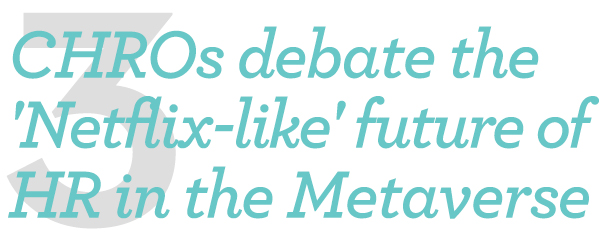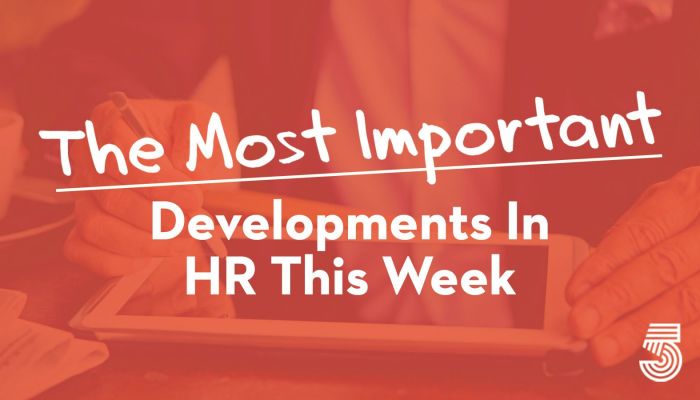The M.I.D., as we call it, is curated by our editorial team from more than 50 news sources. Like a lot of good ideas, this started as something I wanted for myself. If I can’t read everything, I at least want to stay abreast of the most important developments.
This week in HR, Bitcoin reaches retirement plans, CA privacy laws were set to expand to workers, the Metaverse was poised to come for HR, location-based salaries were debated (nobody agrees) and interviewer training took the spotlight after some disturbing revelations about a former big tech manager.


Bitcoin and cryptocurrency are growing trends that are catching attention and making their way into investment strategies. Now it’s facing its latest introduction in financial matters: retirement plans. Fidelity Investments made waves recently when it announced it’s introducing a new offering that will give people the ability to allocate part of their retirement savings — up to 20% — to Bitcoin through their 401(k) plans. Through its new product, called digital assets account, Fidelity will enable interested employers to offer their employees access to Bitcoin through an investment option in their core 401(k) retirement plans on Fidelity’s platforms. The option will be available broadly to employers mid-year, and MicroStrategy, a business intelligence solutions provider, is on tap to be the first employer to offer the product in its retirement plan. It’s a bold and significant move as Fidelity is the nation’s largest retirement plan administrator, with more than 83 million accounts. Roughly 23,000 companies use Fidelity for their employees’ retirement. HR Executive


California businesses face the prospect of having to apply elements of the state’s landmark privacy law to their own workers. It threatens to wreak havoc on compliance, including for gig economy companies, whose independent contractor models aren’t exempted from the new rules. The state’s consumer privacy law, the first of its kind in the United States, gives consumers the right to know what data is being collected on them and ask that it not be sold. It contains exemptions for certain data related to employees and business-to-business operations, but those carve-outs are unlikely to be extended, removing an important shield for companies and forcing them to extend those rights to workers beginning Jan. 1, 2023. How companies apply those rights to employees and contractors, who generate troves of data and information, remains unclear, attorneys say, since employee privacy is a fairly new concept in U.S. law compared to Europe. “Employee privacy is one of those sleeper issues that has really become central,” said Jeewon Serrato, a partner at Baker & Hostetler LLP in San Francisco. “Not just for the gig economy, but for companies in general.” Bloomberg Law


At a recent panel event attended by HRD, Josh Bersin brought together Rhonda Morris, Vice President and Chief Human Resources Officer at Chevron, Loren Shuster, Chief People Officer at The LEGO Group, and Donna Morris, Executive Vice President and Chief People Officer of Walmart, to debate the future of technology in the HR space. During the event, the question of the Metaverse arose – specifically what HR’s role in the Metaverse will be. Will talent and development rely more and more on digitization – and if so, what will that look like? Bersin told the panel: “I’ve talked to companies that’re doing virtual recruiting events, where young people go to these virtual communities to meet different people inside the company – which is obviously much more efficient than going to a university and sending a bunch of people. And it’ll certainly be used for training. I personally think it’s going to become a pretty significant part of the tech landscape.” In the emerging and as of yet unknown world of the Metaverse, HR will have to carve out its own role. The rapidly evolving nature of digitization means that what we now see as ‘fanciful’ may one day soon be routine. VR, in particular, is being used more and more often in onboarding situations. Human Resources Director


As more companies decide to remain fully remote or adopt a hybrid work model, many are adopting location- or geo-based salaries to account for the varying cost of living expenses among remote employees. But is this the best approach to salaries when supporting a distributed team? And if it is the better way — why isn’t everyone joining in on it? Companies that implement a location-based salary policy essentially raise or reduce employee salaries based on where the employees have personally decided to live and work. It’s an approach that’s particularly impactful for employees who live and work in a big city as opposed to a smaller one, such as New York City vs. Des Moines, Iowa. What does this say about equality, though? How does it impact employee engagement? What are the drawbacks of basing employee salaries on where they live? To get to the bottom of this hot topic, we sought opinions from company leaders who have considered, implemented, or outright rejected location-based salaries. Fast Company


A former manager for Google and Meta bragged on social media about openly discriminating against female job applicants. On May 22, tech professional Patrick Shyu admitted in a now-deleted Twitter post that was captured by Business Insider that he used to trash the resumes of female applicants in front of them during job interviews and immediately reject them. “I told them, ‘Go have some kids. Don’t worry, I’m smarter than you, I know,'” Shyu wrote. After receiving criticism, Shyu tweeted that women shouldn’t work as coders and should instead “prioritize being a good mother and wife,” Business Insider reported. He also suggested that misogyny is a myth and an excuse for “incompetent women who spent too much time researching ‘misogyny’ instead of improving themselves.” On May 26, he tweeted that his opinions are not solidified, “just as how we never stop learning and growing as people.” Shyu’s reported behavior was beyond the pale, but while most other interviewers don’t go that far, many do ask female candidates inappropriate questions that can be perceived as discriminatory and could result in a lawsuit against the company. Some include: Are you married? Do you have kids? Who is responsible for taking your kids to and from school? SHRM










